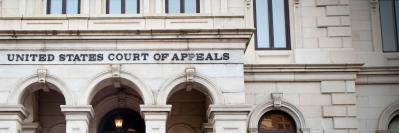
Skilled in Strategic and Effective Appellate Counsel
Parties in high-stakes litigation involving issues critical to their business often end up in appellate courts after trials or summary judgment rulings. Effectively handling briefing and oral arguments in federal and state court appeals requires counsel to have meaningful appellate court experience and sophisticated insights and knowledge regarding the appellate process, the various appellate courts, and the judges. Throughout the past 10 years, we have successfully handled appeals in cases where we have been lead counsel, and presented oral argument in the United States Courts of Appeals for the Federal Circuit, D.C. Circuit, and the Second, Third, Fourth, Sixth, Seventh, Eighth, Ninth, Tenth and Eleventh Circuits, as well as in state appellate courts in California, Delaware, Florida, Illinois, Maryland, Massachusetts, Minnesota, New Jersey, New York and Pennsylvania.
Our appellate lawyers also work together with counsel at the trial level to frame and preserve issues when anticipating an appeal. Trial court moments where our experienced appellate attorneys can add value include dispositive motions, injunction motions, and preparing pretrial filings. Our appellate attorneys also provide trial-monitoring services.
Attorneys in Saul Ewing’s Appellate Practice advise clients on an array of post-trial options, including potential post-trial motions and prospective appeals, and provide detailed analyses and recommendations regarding possible outcomes, risks, and benefits. Our appellate attorneys have extensive experience serving as lead counsel in a wide variety of appeals in federal and state appellate courts across the United States. As a result of our experience, our team has developed finely-tuned appellate advocacy skills that anticipate and facilitate careful comprehension and response to the judges’ questions with an appreciation for the nuances of the judges’ questions and comments. We also employ cutting-edge technologies and rely upon analytical tools to help maximize the probability of strategy success with a particular judge or court.
We advise clients that we have represented before trial courts and regulatory agencies and serve as special appellate counsel in cases involving a wide range of substantive law areas, including class actions, constitutional law, employment law, energy, environmental, higher education, intellectual property, lender liability, negligence and nuisance law, patents, piercing the corporate veil/alter ego law, probate/trust, real estate, securities regulation and litigation, successor liability law, tax law, unfair competition and white collar and administrative law.
In addition, we have substantial experience preparing and filing amicus briefs on behalf of our clients.
Our team features distinguished leaders in the bar, including Fellows of the American Academy of Appellate Lawyers and Litigation Counsel of America, a member of the Minnesota Supreme Court Advisory Committee on the state Rules of Civil Appellate Procedure, and attorneys recognized by Chambers and Benchmark Litigation.

View a selection of our appellate representations:
- A manufacturer of infant products and toys in a patent infringement matter. The Court of Appeals for the Federal Circuit reversed an adverse summary judgment finding of no patent infringement by the U.S. District Court for the District of Rhode Island. The Federal Circuit held that the district court had erred as a matter of law with its claim construction, resulting in a finding of no infringement and partial exclusion of the patentee’s technical expert.
- An interstate natural gas pipeline company in prevailing in consolidated appeals before the United States Court of Appeals for the Third Circuit that arose from a condemnation proceeding in the Middle District of Pennsylvania.
- An operator of an outdoor concert pavilion in recovering a multimillion verdict in a bench trial in which the defendant, an owner and developer of commercial properties, breached an operating agreement that stipulated it would conduct several million dollars’ worth of renovations to modernize the concert facility. The defendant appealed the verdict to the Maryland Court of Special Appeals, which affirmed it in all material respects.
- A university and two of its employees in the successful defense of an appeal to the United States Court of Appeals for the Third Circuit filed by two former university coaches, who were terminated. A district court initially granted summary judgement in favor of the university and its employees on the plaintiff’s claims that the university discriminated against them on the basis of their age and sexual orientation. The Third Circuit affirmed the district court on all counts.
- An interstate natural gas pipeline company in a successful defense in the United States Court of Appeals for the D.C. Circuit en banc. The case involved the condemnation of rights-of-way across two properties in Pennsylvania. The plaintiff claimed that the process by which FERC orders are reviewed in one forum and how condemnations occur in another leads to a delay when FERC issues tolling orders. The plaintiff claimed this violates due process and entitles them to some relief. The court did not award any relief to the landowners, and affirmed the prior substantive decision that FERC had properly determined the public need for the project.
- A management consulting firm in securing the dismissal of cases involving eight franchisees of a nutrition products company alleging breaches of the franchise agreements with our client with prejudice and without leave to amend at trial and also on affirming the dismissal of all claims against our client on appeal in the United States District Court for the Eighth Circuit.
- Multiple health care associations in filing amici curiae briefs on their behalf regarding the governor of Illinois’s executive orders concerning staying at home, closing certain portions of the economy and gathering limits because of the COVID-19 outbreak were challenged by individuals, retailers, chambers of commerce and churches. The briefs highlighted the public health concerns if the restrictions were lifted, or lifted too soon. The briefs focused on transmission of the virus, the lack of sufficient personal protective equipment, and the very real impact on health care workers and the public. In all cases, the courts exercised discretionary authority and granted leave to file amici briefs. We were successful in convincing all of the trial courts that were petitioned to permit the filings. In addition, we were granted leave to file amici briefs in both Illinois appellate courts and the United States Court of Appeals for the Seventh Circuit.
- A large producer of egg ingredients in successfully getting the Seventh Circuit Court of Appeals to affirm the dismissal of a lawsuit against our client in a breach of contract trial in federal court in Indiana.
- A pharmaceutical manufacturer in the successful defense of a favorable ruling regarding a breach of contract claim. After our client and another pharmaceutical company developed a plan to manufacture and sell a generic anti-depressant, the relationship soured. Our client was sued for alleged breach of contract. Following a five-day trial, a jury found for our client. The plaintiff appealed and challenged the district court’s jury instructions and evidentiary rulings. On appeal, we argued that the plaintiff waived these arguments on appeal because it agreed to a general verdict form and did not file a post-trial motion under Federal Rule of Civil Procedure 50(b). The court agreed that the plaintiff had waived any argument concerning the sufficiency of the evidence. In addition, the court further concluded that the rulings on jury instructions, motions to preclude certain testimony of experts and other procedural matters were correct.
- A university in federal litigation in which a student has challenged the university’s sexual misconduct policy on constitutional due process grounds. The case had already been up and back to a circuit court when the trial judge ordered the president of the university to appear in person for a public, on-the-record settlement conference at which the judge expressed an interest in having the president “explain” the university’s sexual misconduct policy. The university petitioned for a writ of mandamus from the circuit court of appeals preventing the district court from holding the conference. The judge of the district court formally opposed mandamus. In an extremely rare and precedential order, the court of appeals granted the petition and issued a very strongly worded opinion and writ of mandamus chastising the district court for exceeding its authority in multiple respects.
- A NASDAQ-listed pharmaceutical company in defending on appeal a favorable decision in the United States Court of Appeals for the Federal Circuit that awarded our client attorneys’ fees against a generic drug maker. The judge had sanctioned the generic drug maker based on litigation misconduct during discovery and at trial.
- An energy company in successfully defending on appeal a favorable summary judgment ruling in federal court, regarding the client’s liability for the environmental liabilities of its predecessor’s subsidiaries and certain veil-piercing contentions regarding an underlying CERCLA claim.